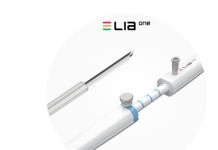Relief Cardiovascular announced it closed a $12 million Series A round to help initiate a first-in-human feasibility study for its Relief System.
Costa Mesa, California–based Relief Cardiovascular, an inQB8 Medical Technologies portfolio company, describes the Relief System as a transcatheter smart implant designed to monitor and modulate renal vein pressures, providing a new approach to heart failure fluid management.
Related: Saluda Medical raises $100M for closed-loop neuromod
On top of supporting the feasibility study, the funds will back further product development.
Broadview Ventures and Advent Life Sciences co-led the round, with participation from Pacific Health Investment, Heartwork Capital, and an undisclosed multinational strategic. Dr. Shahzad Malik, general partner at Advent Life Sciences, and Dr. Maria Berkman, head of Medtech at Broadview Ventures, will join the company’s board of directors as part of the financing.
“Heart failure continues to impose a tremendous burden on patients and healthcare systems,” Berkman said in a news release. “The Relief System addresses a critical gap in patient care, and we are proud to partner with the team at Relief Cardiovascular to advance this novel therapy into the clinic.”
According to Malik, the Relief System’s approach to volume management tackles the unmet needs of diuretic-resistant heart failure. “The Relief System’s ability to dynamically modulate renal vein pressures offers the potential to redefine treatment and improve outcomes for patients facing limited options.”
The Relief System includes a transcatheter implant to reduce renal vein pressure using a”puller” mechanism. It also has integrated sensors that autonomously capture renal vein pressures and multiparametric data. According to the company, the system can provide doctors with actionable data for optimising fluid management, enabling a tailored device-driven intervention.
“The Relief System’s ability to integrate monitoring and therapeutic modulation of renal pressures represents a promising advance in volume management in heart failure,” Dr. William T. Abraham, professor of medicine at The Ohio State University Wexner Medical Center.
Dr. Alex Rothman, professor of cardiology at the University of Sheffield, said: “By enabling data-driven adjustments, the Relief System empowers more personalized and effective care for patients, particularly those with diuretic resistance.”




